

Aspiring teachers ill-prepared to use ed tech effectively. Three-fourths of principals want new teachers to know how to use technology to create authentic learning experiences for students.
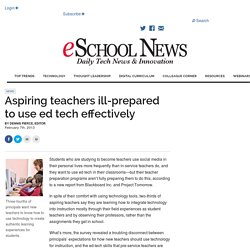
Students who are studying to become teachers use social media in their personal lives more frequently than in-service teachers do, and they want to use ed tech in their classrooms—but their teacher preparation programs aren’t fully preparing them to do this, according to a new report from Blackboard Inc. and Project Tomorrow. Integrating. Integrating. What Successful Technology Integration Must Mean for Educational Leaders. Let's Stop Talking about Teaching with Technology, and Start Talking about Teaching.
Those that know me might be confused by this.
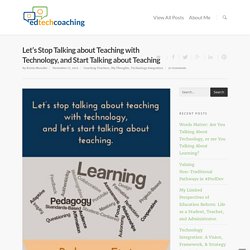
I’ve built my career around education technology. My job is to help teachers integrate technology into their classrooms. Why Are Schools Wasting So Much Money on Ed Tech? America is a lavish spender on education.
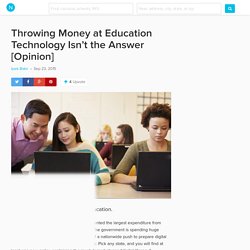
In 2013, education-related spending represented the largest expenditure from state governments, totaling $599.2 billion. The government is spending huge amounts on education technology as part of a nationwide push to prepare digital learners for the demands of the 21st century. Why technology won't transform teaching. Posted by Rebecca Paddick | August 28, 2015 | Secondary teaching, Ian Curtis, Promethean, education technology, schools, edtech, BYOD When it comes to technology use in schools, a misconception exists that infusing classrooms with new technology will miraculously change teaching and learning.

This just isn’t true. Technology won’t magically transform how we teach – transformation will only be achieved if teachers are given the right guidance and direction, as well as a model for effective edtech use. Here we look at three key success factors… 1. Coaching Teachers Toward Effective Technology Use: SAMR & TPACK. I began my journey in Instructional Technology as a child.
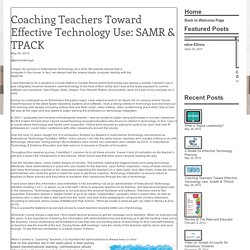
My parents always had a computer in the house. In fact, we always had the newest Apple computer starting with the. Why Do We Need Technology in Schools If It Doesn’t Improve Quality? About ETR Community.

Real-World Professional Development for Teachers - Startup Weekend. About ETR Community.

Edtech 101: E-learning. E-learning refers to the application of information and communication technologies to education.
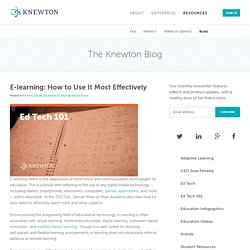
This is a broad term referring to the use of any digital media technology — including tablets, smartphones, electronics, computers, games, applications, and more — within education. A PD Story: Bringing 1:1 Technology to Our District. Digital transformation requires more than the introduction of computing devices into the learning environment.
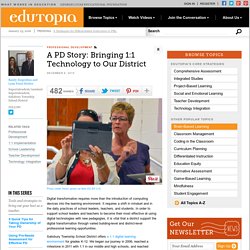
It requires a shift in mindset and in the daily practices of school leaders, teachers, and students. In order to support school leaders and teachers to become their most effective at using digital technologies with new pedagogies, it is vital that a district support the digital transformation through varied building-level and district-level professional learning opportunities. Salisbury Township School District offers a 1:1 digital learning environment for grades K-12.
We began our journey in 2006, reached a milestone in 2011 with 1:1 in our middle and high schools, and reached another milestone in 2014 when we became a digital school district. Throughout the past several years, we have worked diligently to implement the following four actions to maximize our professional development implementation. 1. 2. 3.
Technology Integration Research Review. Editor's Note: This article was originally written by Vanessa Vega, with subsequent updates made by the Edutopia staff.
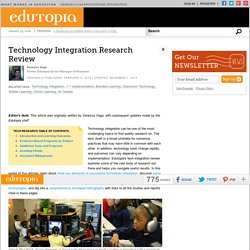
Technology integration can be one of the most challenging topics to find quality research on. The term itself is a broad umbrella for numerous practices that may have little in common with each other. In addition, technology tools change rapidly, and outcomes can vary depending on implementation. Edutopia's tech integration review explores some of the vast body of research out there and helps you navigate useful results. In this series of five articles, learn about three key elements of successful technology integration, discover some of the possible learning outcomes, get our recommendations on specific practices and programs by academic subject and promising tools for additional topics, find tips for avoiding pitfalls when adopting new technologies, and dig into a comprehensive annotated bibliography with links to all the studies and reports cited in these pages.
Technology Integration Research Review: Avoiding Pitfalls. Perhaps the most common complaints about technology integration are that access to tools or spotty connectivity limits the learning. Hardware is purchased in bulk but then left to gather dust, or software is mandated but there is no tech support to make sure it runs smoothly. Despite the many different kinds of tools and the varying levels of commitment to implementation, a few common lessons can help make any kind of technology integration more likely to be successful. Read on for tips to avoid common mistakes. How to Integrate Technology.
When technology integration in the classroom is seamless and thoughtful, students not only become more engaged, they begin to take more control over their own learning, too. Effective tech integration changes classroom dynamics, encouraging student-centered project-based learning. Think about how you are using technology with your students. Are they employing technology daily in the classroom, using a variety of tools to complete assignments and create projects that show a deep understanding of content?
[Webinar] 1:1 Technology Initiative - Using iPad in Classroom. Teaching the Teacher – 21st Century Style. About ETR Community. Education Week. Education Week. WP: BloomBoard / How to Create a Competency-Based Teacher Development Program. JITE v43n2 - Critical Problems Facing Technology Education: Perceptions of Indiana Teachers. Critical Problems Facing Technology Education:Perceptions of Indiana Teachers Edward J. LazarosBall State UniversityGeorge E. RogersPurdue University In 1993 Wicklein conducted a study to determine both the present and the future critical issues and problems facing the technology education (TE) profession.
Wicklein (1993) stated, "If the classroom teachers, teacher educators and the supervisors/ administrators of technology education hope to direct the profession into a desirable future they must understand the issues and problems that will influence the success or failure of technology education" (pp. 55-56). At that time, following its name change from industrial arts in 1985, TE stood in its formative years. As with the implementation of any revised system, there were problems and concerns with the new TE discipline (Linnell, 1992). Brewer, J., & Hunter, A. (1989). Kelly Walsh - 12 Potential Ed Tech Pitfalls. 5 Problems With Technology In Classrooms. Are Schools Getting a Big Enough Bang for Their Education Technology Buck? SOURCE: AP/Elise Amendola A student unpacks a new iPad at Burlington High School in Burlington, Massachusetts.
By Ulrich Boser | Friday, June 14, 2013. Publications. 2015 nmc horizon report k12 preview. Top Ten Issues Shaping Today's Technology Uses in Education. 10 Critical Issues in Educational Technology. Professional Development Bibliography. Newly Added Resources Guidelines for Professional Development of Online Teachers: Based on the SREB "Standards for Quality Online Teaching" Elizabeth Glowa, SREB (Posted in ERIC) Working with member states, SREB developed the nation's first Standards for "Quality Online Teaching," which defines the qualifications of a quality online teacher and the standards needed for academic preparation, content knowledge, online skills and delivery.
Building on those standards, this report presents extensive guidelines that can assist state virtual schools as they hire, train, support and evaluate online teachers. The content and strategies suggested in the guidelines are based on the skills and knowledge essential for high-quality online teaching and describe the support that state virtual schools should provide for their online teachers. The guidelines are comprehensive in scope, and it is anticipated that teachers will gain these skills and knowledge through continuing professional development. Ed Schools Wary of Teaching New Tech Tools to Teachers.